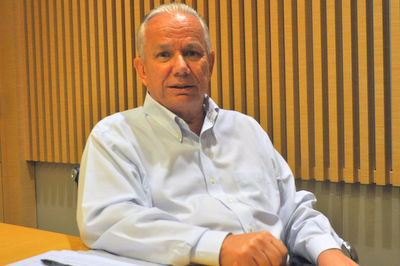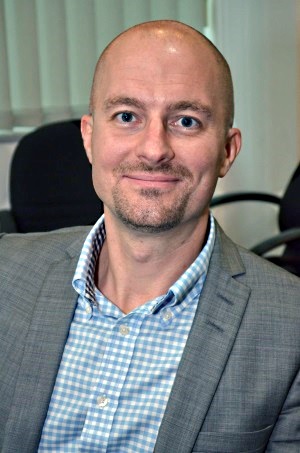Excerpts from the message of Rex International's executive chairman Dan Brostrom and CEO Mans Lidgren in the company's 2015 annual report
| REX VIRTUAL DRILLING VALIDATED |
 Dan Brostrom, executive chairman of Rex International. Dan Brostrom, executive chairman of Rex International. NextInsight file photo.With its use of RVD, the Group had achieved two oil discoveries, in Oman and in Norway, within a short span of two years. This is a feat not yet achieved by many other oil exploration and production companies listed in Singapore. RVD was further validated in the drilling of four out of five wells within the Group’s Norway portfolio in 2015; RVD was not proven in one well as the target depth was not reached. While RVD indications of liquid hydrocarbons were proven right in the four wells, three wells were not successful from a commercial aspect, as porosity and permeability estimates in the geological models were inaccurate. In order to be more self-reliant on the geological and geophysical ("G&G") aspects, further technical development work had been done on RVD so that the most probable porosity and permeability estimates can be predicted. The Group is also developing a “super cube” incorporating seismic data from 500 previously drilled wells in Norway, in order to deepen its understanding of the geology of the Norwegian Continental Shelf. An in-house technical review group comprising Rex Technology Management founder Mr Hans Lidgren and G&G veterans Mr Svein Kjellesvik, Dr Christopher Atkinson and Dr Rabi Bastia was also formed in August 2015, to scrutinise all G&G information shared by third parties to increase the Group’s focus on improving porosity and permeability predictions. The Group opted out from participation in HiRex Petroleum Sdn Bhd’s 20 per cent working interest in VIC/P57 in the Gippsland Basin, Australia, held through its wholly-owned subsidiary, HiRex (Australia) Pty Ltd and in eight licences in Norway as RVD indications were not positive. All wells that were subsequently drilled in these licences proved to be dry. |
STAYING RESOLUTE
The Group maintained its good financial position despite the macro-economic headwinds. As at 31 December 2015, the Company remained long-term bank debt-free, with US$85.08 million in liquid assets comprising cash and cash equivalents and quoted investments. During the year, the Group protected its interests in promising assets when business partners failed to honour their financial commitments.
| “With its use of RVD, the Group had achieved two oil discoveries, in Oman and in Norway, within the short span of two years. This is a feat not yet achieved by many other oil exploration and production companies listed in Singapore. “RVD was further validated in the drilling of four out of five wells within the Group’s Norway portfolio in 2015; RVD was not proven in one well as the target depth was not reached.” |
The Group made capital injections into Lime Petroleum Plc’s (“Lime Plc”) former subsidiaries, Lime Norway and Masirah Oil Ltd, which also carried out restructuring exercises. As at 7 March 2016, the Group has effective stakes of 98.77 per cent and 72.03 per cent in Lime Norway and Masirah Oil Ltd respectvely.
The capital injections in the entities holding stakes in the Oman and Norway assets were timely, as the Group’s confidence in the assets were validated by a new commercial discovery in the Edvard Grieg South (Rolvsnes) prospect in PL338C post the capital raising by Lime Norway.
We remain steadfast with our strategy to leverage on our proprietary technologies to minimise capital outlay in oil exploration and barring other business considerations, to sell oil-in-the-ground, upon a declaration of discovery, at the best possible price.
Despite the challenging market conditions, we were able to execute an active drilling programme in 2015, made possible by taking advantage of attractive fiscal policies and significantly lower drilling costs, and stringent selection of prospects conducted by RVD and our expert team from the Technical Review Committee. As part of its efforts to streamline its investments to preserve cash, the Company pared down its stake in Rexonic AG from 66.67 per cent to 50 per cent.
This allows the Company to remain invested in the unique enhancing oil recovery technology which has promising prospects, with a lower level of working capital contribution. The Company also exited from WA-488-P in Australia where RVD indications were not encouraging, and dropped the acquisition of a stake in an onshore German licence.
The assets in Trinidad were merged into a newly incorporated holding company Steeldrum, to allow the Group to continue meeting its obligations in Trinidad, as well as availing itself to other opportunities that may arise on the island in the current oil price climate, given that the producing wells in the Group’s assets became unprofitable as oil prices fell.
The Group’s indirect wholly-owned subsidiary Rex Caribbean Holding Limited (BVI) now holds 36.86 per cent in Steeldrum. Taking into consideration the challenging environment and lack of economics in FRAM, US$1.79 million of the Group’s investment in FRAM was written off in FY2015.
| WHEN THE STORM BLOWS OVER |
 Mans Lidgren, CEO of Rex International. NextInsight file photo.Demand for oil has not dropped and its long-term trend continues to rise, albeit at a slower pace. There is no short-term significant substitute for oil when it comes to fuel for powering transportation on land, sea and air. Mans Lidgren, CEO of Rex International. NextInsight file photo.Demand for oil has not dropped and its long-term trend continues to rise, albeit at a slower pace. There is no short-term significant substitute for oil when it comes to fuel for powering transportation on land, sea and air. Oil prices have declined because currently supply outstrips demand due to high production investments in recent years, but with the significant cutback in investments in new wells and production from 2015, coupled with gradual rising demand spurred in part by low prices, may reverse the imbalance in supply and demand, leading to an eventual price recovery for oil. Rex is in a good financial position and will continue to minimise exploration risks with its proprietary RVD technology and geological review by its Technical Review Committee, and will only participate in selected drilling campaigns that are economically viable in the current challenging environment. Lime Norway is participating in the drilling of a well in PL544 which started in January 2016, and Masirah Oil Ltd is planning to drill one to two wells in 2016. We want to remain active by accumulating ready resources to monetise when the oil prices recover. |






